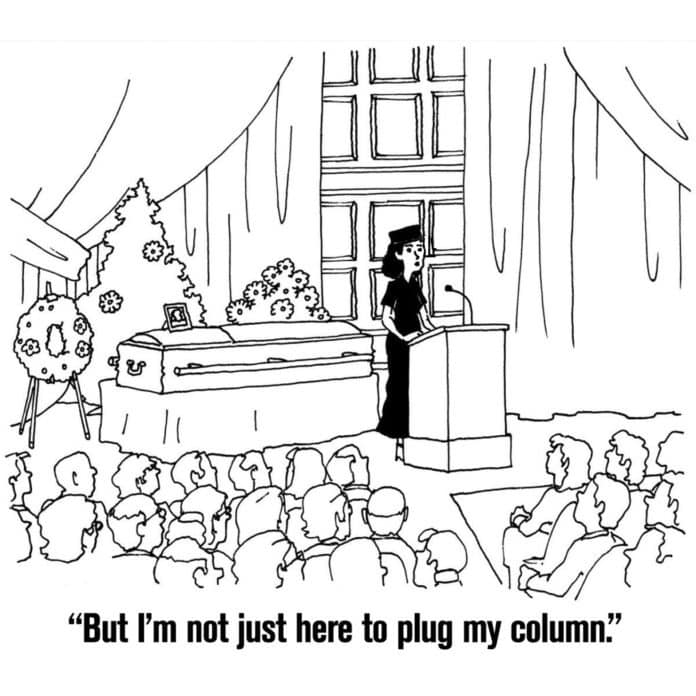
‘If you don’t go to a man’s funeral, how can you expect him to come to yours’, a pub philosopher once told me with great earnestness. I left it at that!
We might have lost much of our old ways and traditions during the boom years, but to our great credit we are still good funeral goers in Ireland. I have attended funerals where there were no family left, and yet the neighbours all turn out along with the friends of the departed to pay their respects and say their farewell.
Sometimes in graveyards a few words are spoken by someone after the prayers are said – often by a family member, a colleague or a close friend: This is a farewell tribute which is usually deserved and can be a comfort to those left behind. It is a fitting end to the day’s ritual when executed in good taste.
I am not a fan of the eulogy given by a lay person during the funeral service in the church. A couple of such burlesqued speeches spring to my mind. Neither am I enamoured by the modern practice of giving rounds of applause instead of respectful silence.
At a handful of funerals over the years, I have partaken of the collective cringe in the church, brought on by how the deceased was being portrayed from the altar. I have looked around for familiar faces, just to reassure myself that I was at the right funeral.
In fairness; the word ‘eulogy’ translates from the Greek to ‘good words’, so perhaps that means that only good words can be spoken and never mind the truth. I have found myself listening to rambling accounts of a person’s life that were … shall we say, sort of selective – and that would be putting it mildly.
The actual person, with his human flaws and weaknesses was replaced by a paragon of virtue, wit (especially wit!) and just about unrecognisable to those of us who came along to pay our respects to the man or woman we knew and liked as they really were in life.
Speaking of the dead is the only time when the opposite of truth is not necessarily a lie; because we are told we cannot speak ill of the dead. Oh, but the eulogy really pushes this premise to its extremity with the greatest platform for phoney speak. Sometimes the stretching proves too much for everyone involved.
I love the story told by my favourite columnist, Billy Keane, of the obnoxious individual who died in Listowel and nobody could be found who would come up with a good word to say about him. The uncomfortable situation was rescued from the gloom when an old geezer sitting in the corner spoke up with the words. ‘The brother was worse’!
Eulogies in church detract from the solemn and sacred nature of the liturgy – especially the recent trend where the speaker feels the necessity to entertain the crowd to a few laughs. Naturally, only ‘good words’ are expected and it becomes so easy to idealize the dead when they are no further threat to the living.
The fellow who would steal the cross off an ass’s back becomes a ‘likeable rogue’. The woman with a bit of a reputation is now ‘the fun loving life of the party’. ‘He lived life on the edge’, is coded for you couldn’t trust him as far as you could throw him.
My old friend Pat Burke, advised me more than once; ‘Some day they will all be saying nice things about you and me – but the only problem is that we will have to die first’! Or as the man said; ‘Nothing improves one’s reputation more than death’!
This column has just hit on an inspired idea as to how to restore the place of the eulogy in church. We could each write our own? Now wouldn’t that be an interesting development and make it well worth going in good time to funerals – and not timing to arrive as the coffin is coming out the back door?
Can you imagine the tension-filled anticipation as the priest on the altar broke the seal of the envelope and started to read? The high level of expectation sending a current throughout the church: Those in the yard pushing and shoving to get close enough to hear the priest. Such feelings of apprehension in the first four pews as the rest of the congregation folded their arms and awaited the main event with bated breath. Would it be more honest?
Surely the answer is yes and wouldn’t it be fascinating to hear what the deceased thought of themselves? The more I think about it, the more I am convinced this is the start of yet another brilliant innovation originating from ‘You Can’t Be Serious’.
Some of you will be thinking already of writing beautiful prose and leaving wise words to be remembered in your name. My own eulogy will be simple – and sure I might as well tell you all now. The last four words you will ever hear from me will be. ‘The brother was worse’!
Don’t Forget
Everyone should fear death until he has something that will live on after his death.






